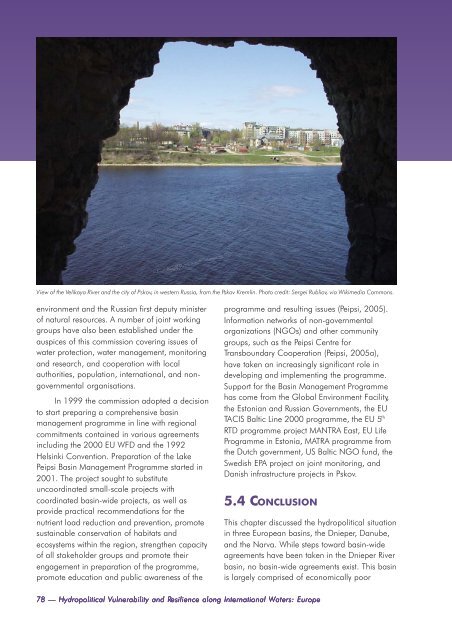Europe - UNEP
Europe - UNEP
Europe - UNEP
Create successful ePaper yourself
Turn your PDF publications into a flip-book with our unique Google optimized e-Paper software.
View of the Velikaya River and the city of Pskov, in western Russia, from the Pskov Kremlin. Photo credit: Sergei Rubliov, via Wikimedia Commons.<br />
environment and the Russian first deputy minister<br />
of natural resources. A number of joint working<br />
groups have also been established under the<br />
auspices of this commission covering issues of<br />
water protection, water management, monitoring<br />
and research, and cooperation with local<br />
authorities, population, international, and nongovernmental<br />
organisations.<br />
In 1999 the commission adopted a decision<br />
to start preparing a comprehensive basin<br />
management programme in line with regional<br />
commitments contained in various agreements<br />
including the 2000 EU WFD and the 1992<br />
Helsinki Convention. Preparation of the Lake<br />
Peipsi Basin Management Programme started in<br />
2001. The project sought to substitute<br />
uncoordinated small-scale projects with<br />
coordinated basin-wide projects, as well as<br />
provide practical recommendations for the<br />
nutrient load reduction and prevention, promote<br />
sustainable conservation of habitats and<br />
ecosystems within the region, strengthen capacity<br />
of all stakeholder groups and promote their<br />
engagement in preparation of the programme,<br />
promote education and public awareness of the<br />
programme and resulting issues (Peipsi, 2005).<br />
Information networks of non-governmental<br />
organizations (NGOs) and other community<br />
groups, such as the Peipsi Centre for<br />
Transboundary Cooperation (Peipsi, 2005a),<br />
have taken an increasingly significant role in<br />
developing and implementing the programme.<br />
Support for the Basin Management Programme<br />
has come from the Global Environment Facility,<br />
the Estonian and Russian Governments, the EU<br />
TACIS Baltic Line 2000 programme, the EU 5 th<br />
RTD programme project MANTRA East, EU Life<br />
Programme in Estonia, MATRA programme from<br />
the Dutch government, US Baltic NGO fund, the<br />
Swedish EPA project on joint monitoring, and<br />
Danish infrastructure projects in Pskov.<br />
5.4 CONCLUSION<br />
This chapter discussed the hydropolitical situation<br />
in three <strong>Europe</strong>an basins, the Dnieper, Danube,<br />
and the Narva. While steps toward basin-wide<br />
agreements have been taken in the Dnieper River<br />
basin, no basin-wide agreements exist. This basin<br />
is largely comprised of economically poor<br />
78 — Hydropolitical Vulnerability and Resilience along International Waters: <strong>Europe</strong>
















